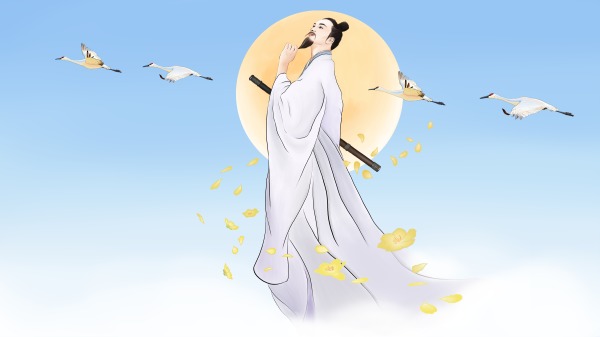
被後人譽爲「詩仙」的唐代大詩人李白。(手繪插畫:Winnie Wang/看中國)
日本學者、翻譯家小畑薰良(Shigeyoshi Obata,1888-1971),明治二十一年6月30日生於日本大阪府一戶富裕的農家。父親小畑萬治郎通漢學,在小畑薰良學習假名前,就教他《論語》。也許因為家學淵源,受父親治學熏陶,小畑薰良從小熱愛中國古典文學,諳熟李白詩歌。
1906年,他從大阪茨木中學畢業,入早稻田大學預科文科班,隨後升入早稻田大學。1907年,小畑薰良從早稻田大學退學,去美國留學。他先後畢業於威斯康辛大學、芝加哥大學。之後在芝加哥大學研究生院攻讀中世紀英國文學。
後來他作為日本外務省翻譯官,任職紐約日本總領事館。期間他翻譯出版了《李白詩集》。他曾應邀去歐洲,遊學一年,1925年回日本。他廣泛接觸東西方社會、語言、文學,促使他形成海納百川的心態。
1922年,小畑薰良在紐約出版了他英譯的《李白詩集》(The Works of Li Po,the Chinese Poet)。該書共選譯李白詩一百二十四首(包括杜甫等有關李白的詩八首)。世界上最早、最全面翻譯李白詩歌成英文的就是這位日本人。
全書融翻譯與研究、作品和資料為一體,為西方世界提供第一部李白詩集專輯,深受英文讀者歡迎,影響深遠。
呂叔湘先生評述小畑薰良譯筆曰:「以平實勝」,「所謂平實,非一語不增,一字不減之謂也。小畑之譯太白詩,常不以貌似,而語氣轉折,多能曲肖。」
現從英譯《李白詩集》中選錄八首中英文對照的詩,略加評註。
春日醉起言志
處世若大夢,胡為勞其生?
所以終日醉,頹然臥前楹。
覺來盼庭前,一鳥花間鳴。
借問此何時,春風語流鶯。
感之欲嘆息,對酒還自傾。
浩歌待明月,曲盡已忘情。
AWAKING FROM SLEEP ON ASPRING DAY
Life is an immense dream,why toil?
All day long Idrowse with wine,
And lie by the post at the front door.
Awakening,I gaze upon the garden trees,
And,hark,a bird is singing among the flowers.
Pray,what season may this be?
Ah,the songster』s amango-bird.
題目中「言志」指詩歌,語出《書.舜典》「詩言志」,省譯了。「處世」有live in the world之意,譯為life,可也。「處世若大夢」修辭用明喻(simile),而Life is an immense dream.修辭用隱喻(metaphor)。「醉」不用drunken翻譯,用drowse with wine,雅得多。此處「流鶯」絕非prostitute,譯者用mango-bird(一種蜂鳥)譯之。
月下獨酌
花間一壺酒,獨酌無相親。
舉杯邀明月,對影成三人。
月既不解飲,影徒隨我身。
暫伴月將影,行樂須及春。
我歌月徘徊,我舞影零亂。
醒時同交歡,醉後各分散。
THREE WITH THE MOON AND HIS SHADOW
With ajar of wine Isit by the flowering trees.
I drink alone,and where are my friends?
Ah,the moon above looks down on me;
I call and lift my cup to his brightness.
And see,there goes my shadow before me.
Hoo!We』re aparty of three,I say,—
Though the poor moon can』t drink,
And my shadow but dances around me,
We』re all friends to-night,
The drinker,the moon and the shadow.
Let our revelry be met for the spring time!
I sing,the wild moon wanders the sky.
I dance,my shadow goes tumbling about.
While we』re awake,let us join in carousal.
Only sweet drunkenness shall ever part us,
Let us pledge afriendship no mortals know,
And often hail each other at evening
Far across the vast and vaporous space!
此處「相親」並非男方、女方論婚談嫁初次見面,而是指朋友。「月將影」,即月與影。「無情遊」意為忘卻世情之交遊,英譯為a friendship no mortals know(無人知道的友誼)。「雲漢」本指銀河,此處借指仙境,英譯成the vast and vaporous space。
訪戴天山道士不遇
犬吠水聲中,桃花帶露濃。
樹深時見綠,溪午不聞鐘。
野竹分青靄,飛泉掛碧峰。
無人知所去,愁倚兩三松。
ON GOING TO VISIT ATAOIST RECLUSE ON MOUNT TAI-TIEN,BUT FALLING TO MEET HIM
A dog barks afar where the waters croon.
The peach flowers are deeper-tinted,wet with rain.
The wood is so thick that one espies adeer at times.
But cannot hear the noon bell in this lonely glen.
The wild bamboos sway in the blue mist,
And on the green mountainside flying cascades glisten.
What way has he gone?There is none to tell;
Sadly Ilean against apine tree here and there.
本篇寫於唐開元六、七年(718-719),李白十八、九歲時。當時他隱居在戴天山(又名大康山或大匡山,在四川昌隆縣北五十里。)大明寺內讀書。「桃花帶露濃」,一為桃花增色,二點出入山時間為早晨,與「溪午不聞鐘」在時間上相映照,言正午時來到溪邊,卻不聞鐘聲,暗指道士未歸。「青靄」,青色的雲氣。全詩翻譯明白平實,有身臨道士生活的世外桃源之感。
(未完待續)
